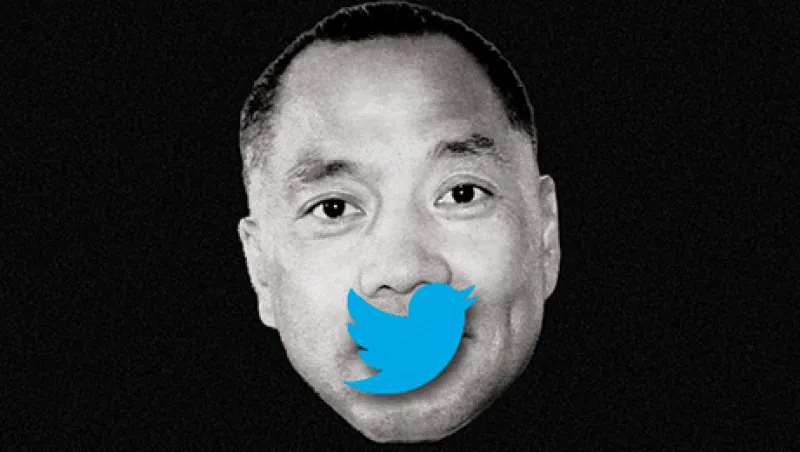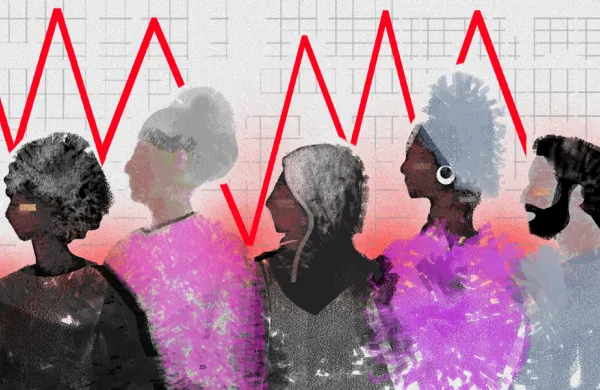U.S. President Donald Trump isn’t the only real-estate tycoon who stirs up a storm with his tweets.
Living in self-imposed exile since early last year in a high-rise luxury apartment overlooking New York’s Central Park, Chinese real-estate tycoon Guo Wengui has been sending out so many controversial tweets and YouTube podcasts that he is now a wanted man back in China.
Interpol, the inter-agency of global police agencies, issued a “red alert” for Guo’s arrest in mid-April at the request of Chinese authorities, who want him back because he stands accused of bribing former top Chinese counterintelligence officer, Ma Jian. Ma, a former vice minister of state security, was jailed for life a few years ago after being caught up in investigations into Bo Xilai, a Chinese politician who challenged and lost to President Xi Jinping in a leadership bid back in 2012.
Guo, who also goes by the name of Miles Kwok, has libel lawsuits against him adding up to $5.3 billion from various Chinese notables, including movie star Fan Bingbing, who have accused him of defaming them in a series of scandalous tweets that allude to corruption and illicit sex between them and senior Chinese politicians.
Besides the defamation lawsuits, Guo — the founder and chairman of real-estate developer Beijing Zenith Holdings — is facing a lawsuit and lien on his Central Park apartment, a full-floor co-op on the top levels of The Sherry-Netherland hotel building. Brought by Hong Kong-based PAG, an $18 billion hedge fund manager, the lien is an attempt to claim back an $88 million unpaid loan that the firm’s Pacific Alliance Asia Opportunity Fund extended to Guo more than a decade ago for the development of a project in Beijing.
Guo disputes the lien and seems unfazed about the other lawsuits. On Aug. 12, he tweeted an advertisement for his next podcast: “Stayed tuned for my next exciting broadcast! It’ll be at 9 am New York time on Aug. 18, or 9 pm Beijing time Aug. 19.”
Guo did not respond to requests for comment.
His scandalous tweets are more than just showmanship, say scholars of Chinese politics. They may have significant impact on the upcoming 19th Party Congress, which is due to be held on October 18th in Beijing and will determine who sits on the Politburo Standing Committee, the lineup of top officials to lead China through 2022. Xi, who is guaranteed a second term as the president and chairman of the committee, has long been counting on keeping at his side a key ally, China’s anti-corruption tsar Wang Qishan. The problem is that Wang, who turned 69 this year, has been one of the primary targets of Guo’s salacious allegations of illicit sex and corruption.
“It is next to impossible to verify the truthfulness of Guo’s piles of allegations,” says Willy Lam, an adjunct professor at the Center for China Studies at the Chinese University of Hong Kong and a leading expert on Chinese politics. “What is probably true is that those allegations have damaged Wang Qishan’s reputation to some extent.”
In normal circumstances, Lam notes, these negative reports would hurt the chances of Wang getting another five-year term as a member of the Politburo Standing Committee. “Yet whether Wang will or will not stay in the standing committee depends largely on his relationship with supreme leader Xi Jinping,” Lam says. “If Xi needs him to fend off his enemies, Wang may indeed be given a second five-year term.”
Guo’s slew of allegations is also at the root of Beijing’s recent crackdown on a number of major Chinese conglomerates, halting their global merger and acquisition sprees, according to Lam. Guo has alleged that many Chinese groups that have made large acquisitions overseas have strong ties to political patrons in China, including families of former top leaders, some of whom have resisted President Xi’s consolidation of power in recent years.
Among firms that have fallen under regulatory scrutiny is aviation and investment conglomerate HNA Group, whose purchases of high-profile U.S. financial firms include a deal to buy a stake in former White House communications director Anthony Scaramucci’s SkyBridge Capital. Entertainment and real-estate investor Wanda Group, insurance and investment firm Fosun International, and Anbang Insurance Group Co. have also caught the attention of China’s watchdogs. Anbang, for instance, is under pressure to sell some of its foreign assets, which include the Waldorf Astoria Hotel in New York, a property acquired for $1.95 billion in 2014, according to sources.
“The veracity of Guo’s allegations about these groups is also hard to prove,” says Lam. “However, he has exposed the unconventional ways in which these multi-billion-dollar private firms enjoy the support of the party’s top clans.”






